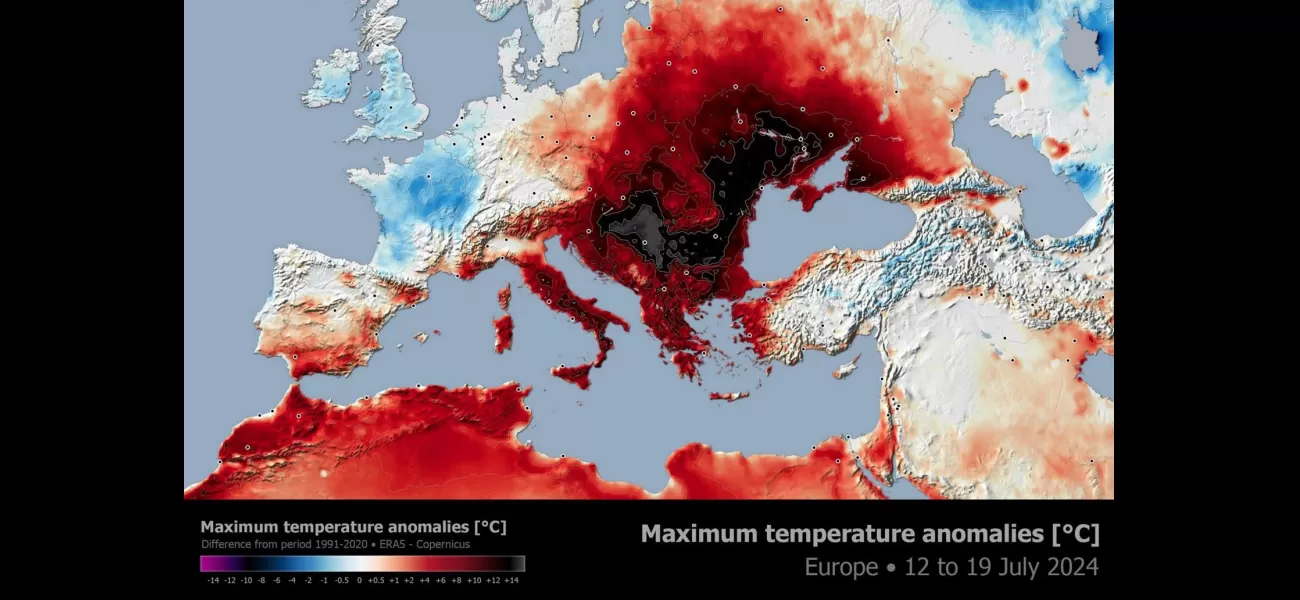A map tracks the route of damaging wildfires during a scorching 44°C heat wave across Europe.
Europe is experiencing extremely hot weather.
July 16th 2024.

As summer heats up, temperatures in some parts of Europe have reached a scorching 45°C. The soaring heat has sparked numerous wildfires, causing concern for the safety of residents and travelers alike. This extreme weather, originating from a hot air mass from the Sahara desert, has taken a devastating toll on southern Europe, with reports of heat-related deaths in Italy. And it seems that this heatwave is not going away anytime soon, as forecasters predict it will last until at least the end of the week.
To put things into perspective, the current temperatures are about 10 degrees higher than the average for this time of year. This means that if you're planning a holiday in Europe, it's important to be aware of the extreme weather conditions. Let's take a look at some of the countries that have been affected by this heatwave.
Greece, for example, is facing its most severe wildfire risk in two decades. The country is experiencing a water shortage, with some reservoirs at their lowest levels in 10 years. In the past 24 hours, 47 fires have ravaged the country, with 15 still ongoing. The westernmost Greek island of Kea has been hit hard, with helicopters swooping in to collect water from the Aegean Sea and drop it on the flames. And it's not just the islands that are affected. In the Ionian islands, multiple homes have been evacuated as the fires continue to spread. The situation is equally dire in the southern Corinth area and on the island of Lesbos, where warnings have been issued and residents are on high alert.
Moving on to Turkey, where the wildfires have had deadly consequences. In the western province of İzmir's Çeşme district, the charred bodies of a child, a woman, and a man were discovered in a burnt woodland. Strong winds have caused the fires to spread rapidly, leading to multiple evacuations. The situation has become so dire that neighboring countries, such as Serbia and Slovenia, have been asked for help.
North Macedonia has also declared a state of crisis and requested assistance from Serbia to fight the forest fires. In response, Serbian interior minister Ivica Dacic has confirmed that they will be providing support. The situation is equally alarming in Bosnia, where the Serb Republic has also requested a firefighting helicopter from Serbia to help contain a major fire near Gacko. The wildfires have been relentless, affecting over 1,000 hectares of land, with more than 17 fires burning in mountainous regions.
Bulgaria is also struggling to contain the fires, with the city of Stara Zagora in a state of emergency. In the village of Shtit, a 19-year-old boy suffered severe burns while trying to save his bee farm. And it's not just the countryside that's being impacted. A popular holiday destination for British tourists, Burgas, has also been hit by a wildfire. The flames have burnt thousands of acres, mostly in mountainous villages.
As for Italy, the scorching temperatures have reached a dangerous 45°C. Sadly, this has resulted in the deaths of at least four people, suspected to be caused by heatstroke. Cities like Rome, Naples, and Florence, along with other popular tourist destinations, are feeling the heat and have issued red alerts until Wednesday. The Italian Ministry of Health has advised people to stay indoors and stay hydrated to avoid heat-related illnesses.
The heatwave has also affected other European countries, including France, Spain, Poland, and Ukraine. In the Czech Republic, the capital city of Prague, where temperatures reached 34°C last week, the zoo has had to deliver ten tons of ice to keep the animals cool. It's clear that this extreme weather is not to be taken lightly and it's important to take precautions to stay safe during this heatwave.
To put things into perspective, the current temperatures are about 10 degrees higher than the average for this time of year. This means that if you're planning a holiday in Europe, it's important to be aware of the extreme weather conditions. Let's take a look at some of the countries that have been affected by this heatwave.
Greece, for example, is facing its most severe wildfire risk in two decades. The country is experiencing a water shortage, with some reservoirs at their lowest levels in 10 years. In the past 24 hours, 47 fires have ravaged the country, with 15 still ongoing. The westernmost Greek island of Kea has been hit hard, with helicopters swooping in to collect water from the Aegean Sea and drop it on the flames. And it's not just the islands that are affected. In the Ionian islands, multiple homes have been evacuated as the fires continue to spread. The situation is equally dire in the southern Corinth area and on the island of Lesbos, where warnings have been issued and residents are on high alert.
Moving on to Turkey, where the wildfires have had deadly consequences. In the western province of İzmir's Çeşme district, the charred bodies of a child, a woman, and a man were discovered in a burnt woodland. Strong winds have caused the fires to spread rapidly, leading to multiple evacuations. The situation has become so dire that neighboring countries, such as Serbia and Slovenia, have been asked for help.
North Macedonia has also declared a state of crisis and requested assistance from Serbia to fight the forest fires. In response, Serbian interior minister Ivica Dacic has confirmed that they will be providing support. The situation is equally alarming in Bosnia, where the Serb Republic has also requested a firefighting helicopter from Serbia to help contain a major fire near Gacko. The wildfires have been relentless, affecting over 1,000 hectares of land, with more than 17 fires burning in mountainous regions.
Bulgaria is also struggling to contain the fires, with the city of Stara Zagora in a state of emergency. In the village of Shtit, a 19-year-old boy suffered severe burns while trying to save his bee farm. And it's not just the countryside that's being impacted. A popular holiday destination for British tourists, Burgas, has also been hit by a wildfire. The flames have burnt thousands of acres, mostly in mountainous villages.
As for Italy, the scorching temperatures have reached a dangerous 45°C. Sadly, this has resulted in the deaths of at least four people, suspected to be caused by heatstroke. Cities like Rome, Naples, and Florence, along with other popular tourist destinations, are feeling the heat and have issued red alerts until Wednesday. The Italian Ministry of Health has advised people to stay indoors and stay hydrated to avoid heat-related illnesses.
The heatwave has also affected other European countries, including France, Spain, Poland, and Ukraine. In the Czech Republic, the capital city of Prague, where temperatures reached 34°C last week, the zoo has had to deliver ten tons of ice to keep the animals cool. It's clear that this extreme weather is not to be taken lightly and it's important to take precautions to stay safe during this heatwave.
[This article has been trending online recently and has been generated with AI. Your feed is customized.]
[Generative AI is experimental.]
0
0
Submit Comment





